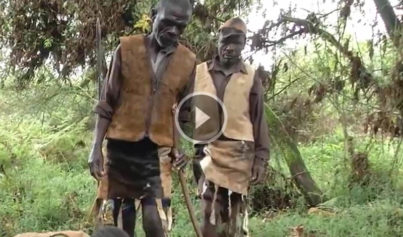Though gay sex is already illegal in Uganda, the speaker of Uganda’s parliament promises that an even stricter anti-gay bill will easily pass this year and will be a “Christmas gift” to the nation.
The bill originally contained a measure calling for the death penalty for people found guilty of “aggravated homosexuality,” which was defined as one of the participants being a minor, HIV-positive, disabled or a “serial offender.” But the death penalty has been removed and replaced with shorter prison sentences, according to published reports, though under certain circumstances offenders could get life sentences.
“Ugandans want that law as a Christmas gift. They have asked for it and we’ll give them that gift,” parliament speaker Rebecca Kadaga told Reuters on Tuesday.
The new bill also prohibits any “promotion” of gay rights and calls for the punishment of anyone who “funds or sponsors homosexuality” or “abets homosexuality”.
According to James Nsaba Buturo, the former ethics minister and a coalition leader, the bill is extremely popular in Uganda.
“I can tell you it has 99 percent chance. It will pass. No question about it,” Buturo said. “If there was any leader in this country who sympathizes with homosexuality, he will not say it in public. Because he knows that Ugandans, by and large, do not support that way of life.”
But the response of the international community has been extremely critical of Uganda. President Barack Obama has called the legislation “odious,” while some international donors threaten to cut off aid if the bill is signed into law.
Buturo said outsiders who criticize the bill are engaging in a “culture war” with Uganda. He said the fact that it was re-introduced after being shelved by the last parliament shows his country will not be deterred by threats of aid cuts.
“We are saying to the world and to those who are supporting this way of life of theirs, ‘Come what may.’ They have no right whatsoever to impose their preference on this nation,” he said.
Clare Byarugaba, the co-coordinator of the Coalition on Human Rights and Constitutional Law, said gay rights activists are pessimistic.
“The time that we have from now until Christmas, is a very short time for a bill to be tabled and then debated and then passed,” Byarugaba says. “But, of course, there’s fear that it can actually happen.”
Byarugaba said pressure from local human rights groups speaking out in opposition is more effective than criticism from outsiders through the media, since the debate is being framed in the country as Uganda standing up to Western culture.
“We call upon the international community not to speak out in the media about these issues. Whatever actions that are going to be done, should be done diplomatically, with the relevant stakeholders of this country,” she says. “And, let the Ugandan community and the Ugandan human rights organizations and allies to do the groundwork.”
Homosexuality is illegal in 37 countries on the African continent, including Uganda, and activists say few Africans are openly gay, fearing imprisonment, violence and loss of jobs.


